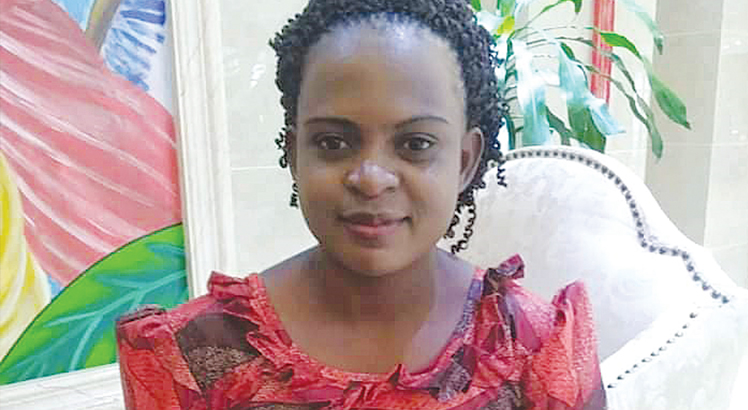In 2009 when Tionge Mtambo was 15 years old, she was married off to a man who was much older than her.
He was 46 years old and had married two other wives, meaning Tionge was the third.
Explains Mtambo: “When I was in Form Two at Chitipa Secondary School, I remember coming back from school one day only to see an extra cow in our kraal. I did not ask thinking someone had brought it for safe custody.
“After a week, my grandmother asked me to accompany her to Tanzania where she said she wanted to visit her friend.
“Innocently, I accepted and we started the journey which would lead me into early marriage. I had no idea.”
Her paternal grandmother and uncles made this arrangement as her mother had returned to her village following the death of her father in 1998. She was four at the time.
On reaching Tanzania, the duo was welcomed by some elderly women who wasted no time but went straight into marriage counselling.
This gave her a clue that she had just been married off.
Says the 28-year old primary school teacher: “That night I could not sleep. I was troubled because wanted to continue with education to become a nurse.
“At dawn, I asked my grandmother to escort to the toilet and she refused.
“I thank God because that was my chance to escape. In fact, I wanted to run away from the pre-arranged marriage, but did not know how.”
So, she walked all day and night to reach Chitipa.
She met a woman who used to come to their school for Student Christian Organisation of Malawi (Scom) prayers and she explained to her what happened.
The women helped her to escape further.
Says Mtambo: “She gave me transport money to go far to live with some relations.
“It was not easy to escape prearranged marriages because they are part of our culture.
“My mother was married off in the same manner, so were all my aunts. Almost every girl in our community was passing through this.”
This was her worst nightmare, not only because she was young, but also because by then she had not yet accomplished her dreams.
“Honestly, at 15, I was not strong enough to withstand challenges of married life,” she says.
Statistics shows that about 46 percent of girls in the country are married off before their 18th birthday, and nine percent before reaching 15.
This comes against the background of the findings of the
A study by Budget Scoping Study on Ending Child Marriage— commissioned by the United Nations Children’s Fund and Ministry of Gender, Community Development and Social Welfare—partly attribute early marriages to lack of funds among government ministries departments and agencies in involved in campaigns against early and forced marriages.
The second born in a family of three children is now a primary school teacher at Nahayombo Primary School in her home district of Chitipa.
She joined the profession to be closer to girls, give them hope and inspire them to work hard in class in order to achieve their potential.
She did not stop there.
Last year, she registered an organisation, Girl Rise Initiative Malawi, which eradicates child marriages and promotes their rights.
The initiative is also into girls and women’s economic empowerment.
So far, she has reached over 60 vulnerable girls. The initiative provides them with school uniforms, learning materials and sanitary pads to encourage them to focus their attention on education.
Explains the activist: “I am motivated to help girls escape child marriages because I am a child marriage survivor.
“They should report to relevant authorities when they see a girl has fallen in this trap.”
She observes that a child marriage is a serious issue in the country.
In future, she plans to involve different stakeholders in educating communities in the district on girls’ rights.
She appeals to World Vision Malawi, Plan International and other child rights organisations to support her initiative in cash and kind.
“I want support so that I can implement different interventions such as mobilising communities to come up with by-laws early and child marriages,” says Mtambo
She reckons if communities came up with ideas on how to end child marriages, this malpractice would be significantly reduced.
The young woman says communities should define a child as someone under the age of 18 and take out of marriage anyone under this age.
Her advice to younger girls is that they should work hard, dream big and pursue their dreams.
She encourages girls to work hard in school, saying they have all it takes to achieve what they want in life, and no-one should threaten their right to education.
“It’s their right to enjoy to the fullest. Poverty should not be a reason for any girl to drop out of school and get married.
“They have the potential to be responsible citizens in developing our country,” says Mtambo from Kapenda Village, Traditional Authority Mwabulambya in Chitipa.
Mtambo now holds the Malawi School Certificate of Education (MSCE) attained in 2013; and a teaching certificate obtained in 2017 from Karonga Teachers’ Training College.
Since her college graduation in 2017, she has taught at Chizimu and Nahayombo Primary School where she still works to date.
Mtambo was born on June 19 1994 at Kapenda Hospital and grew up in Kapenda Village which shares a boundary with Tanzania
Mtambo poses with primary school learners she inspires to aim high
The post Tionge mtambo: early marriage survivor turns activist appeared first on The Nation Online.
 Moni Malawi
Moni Malawi 
